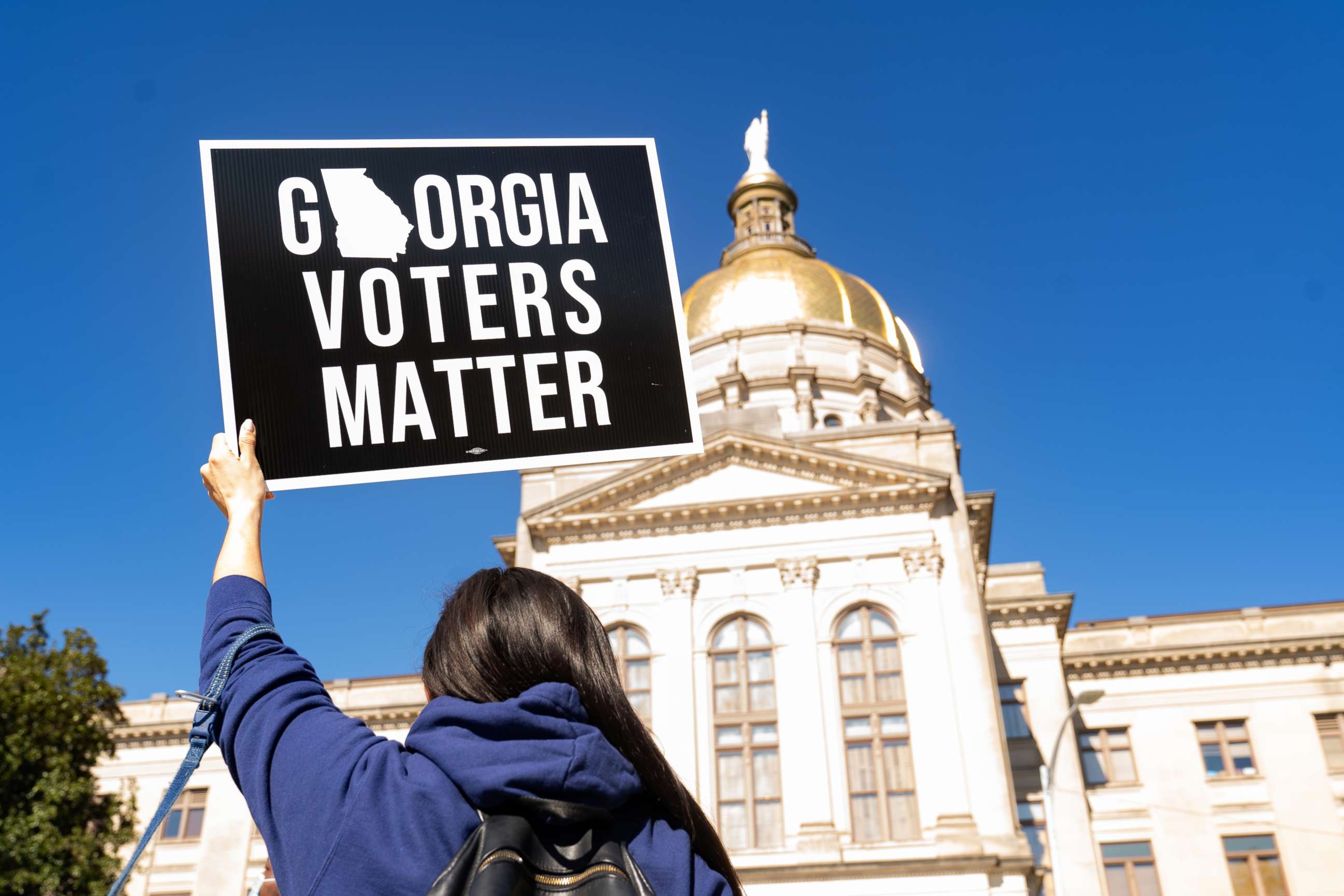Overcoming Democratic opposition, Georgia Senate Republicans advance bill to end no-excuse absentee voting
Republican Lt. Gov. Geoff Duncan and Democrats opposed the bill's passage.
Overcoming universal Democratic opposition, Republicans in the Georgia Senate on Monday narrowly passed a sweeping elections omnibus bill that would eliminate no-excuse absentee voting, which was enacted by Republicans in 2005, just months after a record number of Georgians opted to cast ballots this way in the 2020 presidential election.
Four Republicans did not vote on the bill, which was approved 29-20.
The legislation, SB 241, would also change the absentee ballot verification process. Instead of using the subjective signature match process, voters would be required to include their driver's license or state ID card number when applying for and returning an absentee ballot. Voters without these forms of identification would have to submit a photocopy of another form of accepted ID, as well as provide the last four digits of their Social Security number and their date of birth.
Several Democrats spoke in opposition to the bill and urged lawmakers to vote against it.
"SB 241 creates unnecessary barriers and burdens on voters. It disproportionately impacts racial minorities, the elderly, those that live in rural Georgia, disabled and students," said Democratic state Sen. Jen Jordan. "The motivations are really suspect because it's introduced immediately after voters of color dramatically increase their use of absentee voting this past year."
Multiple Black Democratic lawmakers said they took personal offense to the piece of legislation, hearkening back to the Jim Crow-era and Black Americans' fight not just to earn the right to vote, but to eliminate barriers put in place to curtail it.
"This is not about the process. This is about suppressing the vote of the same group of people, especially me and people who look like me, and I take it personally. I am here in this chamber because of the Voting Rights Act," state Sen. Gail Davenport said. "Some good-hearted legislators want to please a former selfish, racist leader and his followers. Well, I tell you today, don't do it."

The omnibus bill was one of dozens of pieces of legislation on the agenda for the state Senate to consider Monday, which is "Crossover Day" for the Georgia General Assembly. Bills that fail to advance through one chamber by this day are unlikely to become law this legislative session. About one third of the bills on the Senate's agenda for "Crossover Day" addressed election law.
Republican Lt. Gov. Geoff Duncan, the president of the Senate, did not preside over the body as SB 241 was debated because he doesn't support the bill.
"Lt. Governor Duncan has been crystal clear that he does not support the rollback of no-excuse absentee voting in Georgia, which currently is included in SB 241. He staunchly opposes that provision," Macy McFall, Duncan's deputy chief of staff and communications director, told ABC News.
According to the nonpartisan Brennan Center for Justice, as of Feb. 19, more than 250 bills with provisions that restrict voting access have been introduced in 43 states. The organization described these bills as "grounded in a rash of baseless and racist allegations of voter fraud and election irregularities."
Without evidence, former President Donald Trump claimed for months leading up to and following the general election that the presidential contest was "rigged," specifically targeting mail-in voting, falsely claiming it led to widespread fraud.
Georgia Democrats labeled Republican-sponsored legislation limiting voting as "voter suppression bills," claiming they offer solutions for problems that don't exist and will be challenged, and potentially invalidated, in court.
"This bill amounts to walking into your house, seeing a sink full of dirty dishes, loads of laundry to be done, a lawn to be mowed, a refrigerator that's empty, and then deciding that instead of getting to any of that, you're gonna go to the hardware store and start building a deck -- a deck you don't need," said state Sen. Sonya Halpern. "The house is on fire, and you all are building a deck."
But Republicans argued the bills' purposes are to reduce costs, ease county election officials' workload, bolster election security and restore faith in Georgia's elections.
"The two and a half million voters who voted in November who are Republican, who maybe have concerns ... they have a right to have their voice heard in this capitol," said Republican Sen. Jason Anavitarte, speaking in support of SB 241. "I'm sure, you know, I'll get more more tweets from LeBron James and other folks about how I'm suppressing votes, but at the end of the day, every vote should count in this state, and I pray over every single one of us as we move forward through this process ... that we find a way to make sure all Georgians trust the process."
Responding to Democrats' assertion that the bills are unnecessary, Senate Majority Leader Mike Dugan, a Republican, went section-by-section explaining the reason each provision of SB 241 is necessary, and at one point, falsely claimed that the bill he co-sponsored "is not preventing anyone from voting by mail-in absentee," despite section six of the bill outlining the seven specific reasons a voter can be eligible to request a mail ballot.
When closing the debate, Dugan conceded there wasn't widespread fraud, but said, "To say that no adjustments need to be made to address some of the issues that we see coming forward in the state is inaccurate. You don't wait until you have wholesale issues before you try to meet the need. You do it beforehand."
Republican lawmakers' focus on election law follows bruising defeats for the state party in the 2020 election cycle, which the Republican secretary of state has repeatedly defended as secure, accurate and devoid of mass fraud.
"A defeated president to try to take his country down with him by spreading lies about voter fraud ... these lies are now stated as excuses for bills we are voting on today, bills that take voting options away and make it harder to vote," state Sen. Sally Harrell, a Democrat, said Monday, before the bills were taken up.
She added, "But lies can backfire ... these people, when they get mad -- they get organized."

The state House must still debate and vote on the Senate-passed elections bills. The House passed its own elections omnibus bill, HB 531, on March 1. This Republican-sponsored bill does not eliminate no-excuse absentee voting, suggesting there may not be the votes for it in the lower chamber.
However, like the Senate bill, HB 531 does add a photo ID requirement for absentee voting. Adding a photo identification requirement for absentee by mail voters is widely support by Georgia voters, according to a January poll conducted by the University of Georgia for the Atlanta Journal-Constitution.
Democrats and voting rights advocates still blasted HB 531, citing the new ID requirement and other changes it would make to early and absentee voting.
Earning much of the blowback is a provision that requires uniformity in the number of early weekend voting days -- which larger, more diverse counties took advantage of in November 2020.
Every county would have to hold early voting Monday through Friday during the three-week period, as well as on the second Saturday, plus one additional day -- either Saturday or Sunday -- during the first weekend of advance voting. Under current law, only one Saturday of early voting is required but counties can choose to open locations during the other three weekend days that fall in the period.
The state's largest counties, which favor Democrats and are home to many Georgia voters of color, took advantage of this in November 2020, setting up more early voting locations and offering more days of weekend voting compared to past elections. That, combined with the influx of electors voting by mail, resulted in shorter waits on Election Day compared to the hours-long lines that voters in these counties saw during the June primary and in prior elections.
When HB 531 passed a week ago, Fair Fight Action, the voting rights organization founded by Stacey Abrams, described it as "a dangerous attempt to roll back voting rights" that "would add extra hurdles for voters of color and marginalized communities."
After the Senate bill passed Monday, its CEO, Lauren Groh-Wargo, issued a statement, which in part, warned Republicans.
"This blatantly unconstitutional legislation will not go unchallenged," she said. "We will continue to fight in Georgia, in the courts, and in Congress to make sure that Georgians’ voting rights are not infringed."




